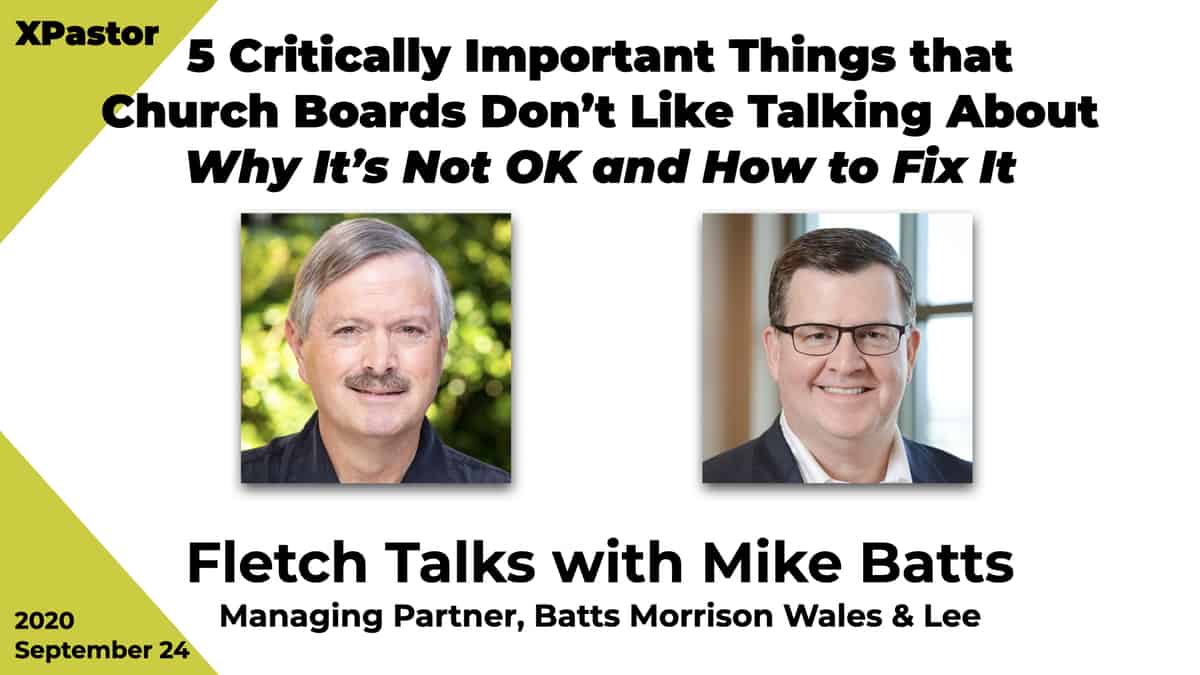XPastor tries to help churches by providing some of the essentials for running a church—items like job descriptions, employment applications, review forms and policies. Below is a “Need for Elders FAQ” from Chatham Community Church, a growing church plant in Pittsboro, North Carolina from 2010.
Why Do We Need Elders?
The Scripture calls Jesus Christ the head of the church. He is our rescuer, defender, brother and King. The Bible also called Jesus the Chief Shepherd, and we are (like it or not) called sheep. Taking this analogy further, Elders are the “under-shepherds” who serve Jesus by caring for His sheep. So, as strange as it seems, Elders have the privilege and burden to be both sheep and shepherds at the same time. It is God’s desire for Elders to lead for the blessing of His people, the protection of His church and the furtherance of His mission. The Bible says of Elders:
Pay careful attention to yourselves and to all the flock, in which the Holy Spirit has made you overseers, to care for the church of God, which He obtained with His own blood. (Acts 20:28)
So, I exhort the Elders among you … shepherd the flock of God that is among you, exercising oversight, not under compulsion, but willingly, as God would have you, not for shameful gain, but eagerly, not domineering over those in your charge, but being examples to the flock. And when the chief Shepherd appears, you will receive the unfading crown of glory. (1 Pet. 5:1-4)
Elders are a blessing to the church. They have been set apart from day-to-day ministry activities in order to serve others through the ministry of teaching the Word and prayer, caring for the sick, restoring the broken, and guiding the church in her life and mission.
When the apostle Paul was planting churches in the first century, he wrote a letter to a church-planting partner named Titus. In the letter, he wrote, “This is why I left you in Crete, so that you might put what remained in order, and appoint Elders in every town as I directed you.” According to Paul, there was something that remained undone in the preparation of the church until Elders had been put in place.
Throughout the New Testament, God’s word shows Elders as the appropriate leadership structure of the local church. For key passages on Elders, see 1 Tim. 3:1-7, 1 Tim. 5:17-19, Titus 1:5-9, Heb. 13:17.
Why Do Other Churches Have Different Leadership Structures?
We recognize that different churches operate in different ways, and this creates confusion for some Christians, especially those that are young in their faith. In discussing leadership, the Bible is primarily a mission handbook, giving guidelines for church mission, beliefs, heart, and general principles for operation. The Bible gives flexibility as to how churches operate within those guidelines, without spelling out exactly how things should take shape in the life of a church.
While there is flexibility in many areas, there are clear guidelines given in other areas. We believe the Bible is clear that Elders are to lead Christ’s church. Although there is freedom as to how many Elders a church should have, how Elders may function, how often they should meet, and many other things, there are clear guidelines given for their character, their role in church leadership, their service of church members, and their focus on the mission of Christ.
What is the Difference Between Elders and Deacons?
Both Elders and Deacons are recognized ministry leaders who model life with Jesus for the congregation. The main difference is in the leadership and direction of the church. Elders are focused on the overall direction and care of the entire church, while Deacons are focused on leading specific ministries.
Elders are the spiritual leaders, shepherds and overseers of all aspects of Chatham Community Church. As shepherds, Elders strive to serve the church like the Chief Shepherd, Jesus. Elders shepherd the church through care, prayer, encouragement, teaching and correction. Elders are devoted to prayer and teaching of the Word. As overseers for the church, Elders function as discerners and guardians of the church who watch over the church’s life and doctrine. Elders lead the way in directional decisions for the church, encourage others in the church’s mission, and delegate ministry to key leaders.
Deacons are recognized ministry leaders who are devoted to serving specific ministries of the church. As key ministry leaders, Deacons help the church fulfill its mission. They assist church leadership in the following ways: providing valuable input to the Elders and/or staff; communicating the vision and heart of the church’s leadership to church members; and working with others to implement the vision in specific ministry areas. We have men and women who serve as Deacons.
Why are We Making the Transition at this Time?
Really, we planned to do this a year ago, but we weren’t ready as a church. We needed some humility and relational restoration to come to our family. God’s been gracious to move us to a place of greater health and unity as a church. Because of this, we feel it’s an appropriate time to make this transition.
Will the Steering Team Continue Once the Elders are in Place?
We will be transitioning from a steering team to an Elder team. Members of the current team may become Elders along with others from our church, but there will not be a steering team once we have an Elder team in place.
How Many Elders Will We Have?
The ministry of the church is primarily the work of the church members as they worship God, love one another, proclaim the message and teaching of Jesus, and further the mission of the local church. Internal structures for church organization are not the main ministry of the church, but are necessary for the equipping and mobilizing of the saints for the work of ministry, as well as protecting the church from harm.
For this reason, church structures should be lean and efficient, not aiming to include as many people as possible in office-holding, but to free as many people as possible to do ministry.
The Bible never specifies how many Elders a church should have. We have not pre-determined a number. We will decide on a number based on the men that God raises up as Elders, sense of calling on the part of potential Elders, gifts, fit, and affirmation of the congregation. If you pressed us for a number, we would anticipate four to six at this time.
What is the Process of Elder Selection?
We believe Elders (in the transition, steering team members are operating in this role) are in the best position to identify potential Elders because of their spiritual maturity, biblical knowledge, connection to the mission and vision of the church, and shepherd’s knowledge of the lives of the congregation. Much time is invested in prayer as we seek to discern who God would call as Elders of the church. The process of discernment that we are following is as follows.
1. Identify those in the congregation who are already bearing fruit in performing Elder functions in the church. We explore questions like these: Who meets the character qualifications of 1 Timothy 3 and Titus 1? Who shows a shepherding care for the spiritual growth of others? Who shows ability and joy in teaching sound doctrine? Who has a spiritual burden for the lost and broken in our community demonstrated in relationships and evangelism? Who is effectively living out the vision and mission of the church?
Along the way, we seek input from Deacons, ministry leaders, and small group leaders. Since 1 Timothy 3 says, “If any man aspires to the office of overseer, it is a fine work he desires to do,” people are also free to approach the steering team to let us know of how God is stirring their heart to serve as an Elder. In addition, the people of the church may always suggest names of people for consideration.
2. Invite the candidate to participate in team meetings. Observe how they contribute. Is there healthy team chemistry?
3. Explore the potential Elder’s life. Is his character above reproach? Are his beliefs sound? Will his work and family schedule accommodate the demands of Eldership?
4. Seek unity among the current Elders (or steering team) regarding whether or not to move ahead with potential Eldership. Unanimity here is important because Elders need to be able to work well with the candidate and respect his character if unity among the Elders is to be maintained after the addition of the new member to the group.
5. Recommend the person to the congregation as a potential Elder. Let this nomination rest with the congregation for a period of time (at least 45 days), during which time members intending to vote “no” can share their concerns with the Elders, and the Elders can, if necessary, withdraw the nomination based on new information.
6. Receive confirmation by a 66% majority affirmation of the call from the congregation at a congregational meeting. If an Elder receives less than 80% affirmation of the congregation, the Elders should prayerfully consider the situation. At times, a percentage between 66-80% may be necessary, but a higher percentage is preferred because it is important that the congregation have confidence in the new Elder, and that the Elder be assured of that confidence by the congregational vote. Otherwise mutual mistrust ensues.
7. Rotate Elders after a three-year term of service (with annual affirmation by the congregation). Give them at least a one-year break, after which the other current Elders could re-nominate them for active service on the Elder team if they are still qualified and it seems appropriate. This system provides healthy accountability for Elders that a lifetime Eldership system seems to lack.
[This process was modified from Mark Dever at www.9Marks.org.]
Do We Get to Nominate Elders?
Our steering team members will nominate potential Elders, but input is invited. The steering team has already sought input and confirmation from Deacons, small group leaders and other ministry leaders. If you would like to designate someone for consideration, your input it always welcome. Please pass any name for consideration along to a current steering team member.
Do We Get to Vote on Elders?
As a church, we have an opportunity for the congregation to affirm the Elders annually. Since Elders are not “running for office,” this is not a popularity contest or democratic vote. Instead, it should be viewed as an opportunity for the congregation to affirm the call of God in the lives of the men that are presented as potential Elders. This also brings some accountability to the Elders. Potential Elders will be announced to the congregation at least forty-five days before the affirmation vote. This allows time for the congregation to bring to our attention any biblical reason why an individual should not become an Elder. Current Elders (or steering team members) should be notified if one of the following are true: Departure from the sound doctrine, character not in line with biblical qualifications for Elders, or a departure from God’s mission to make disciples of Jesus through the ministry of the local church. Other personal differences should be overlooked or worked through on a relational basis in order to preserve the unity of the body.
Will There be a Rotation System for Elders?
The Lead Pastor, once affirmed as pastor, will be an Elder without rotation. The period of service for all other Elders will be three years. Elders will be reaffirmed by the congregation before each year in which they serve.
Can Church Staff be Elders?
The Lead Pastor, once affirmed as pastor, will be an Elder. Other church staff may be Elders, but no more than fifty percent of the Elders may be staff members. Staff Elders will fulfill the same role on the Elder team as non-staff Elders.
Can Women be Elders?
We believe that men and women are fully equal in their humanity, and we believe that God’s plan is for male Elders to lead the local church. For some, these seem like contradictory positions, but we believe both are true. Our model for this view is our God. We believe in a Trinitarian God who is one God in three equal persons: God the Father, God the Son, and God the Holy Spirit. While the Father, the Son, and the Spirit are equally God, the Son willingly submits to the Father and the Spirit willingly glorifies the Son. They play different roles in God’s redemptive plan without competition. The triune God provides the best picture of unity and diversity for us to model in our relationships. This picture provides the basis for our understanding of how equals can function in separate roles in our church.
For reasons given below, we believe the office of Elder is limited to men, while the office of Deacon may be held by both men and women.
We recognize that this is a counter-cultural position that many people, including many Christians, will struggle to understand. Our preference would be to communicate this information personally in the context of a relationship where we could open the Scripture together. That said, we know that this question will come to the forefront for some people, so we thought it best to provide that information here. The following statements provide a biblical context for our view.
The equality of essence between male and female is modeled in creation.
God created man in His own image, in the image of God He created him; male and female He created them (Gen. 1:27).
Male headship is modeled in the creation order.
- Man is made before woman. “It is not good for the man to be alone…” (Gen. 2:18)
- Woman is made for man. “It is not good for the man to be alone; I will make him a helper suitable for him.” (Gen. 2:18)
- Woman is made from man. ” … for Adam there was not found a helper suitable for him. So the Lord God caused a deep sleep to fall upon the man, and he slept; then He took one of his ribs and closed up the flesh at that place. The Lord God fashioned into a woman the rib which He had taken from the man, and brought her to the man.” (Gen. 2:20-22)
- Man names woman. The man said, “This is now bone of my bone and flesh of my flesh; she shall be called Woman, Because she was taken out of man.” (Gen. 2:23)
Paul appeals to this creation order to argue for male leadership in the church.
I want you to understand that Christ is the head of every man, and the man is the head of a woman, and God is the head of Christ. … Man does not originate from woman, but woman from man; for indeed man was not created for the woman’s sake, but woman for the man’s sake. (1 Cor. 11:3, 8)
But I do not allow a woman to teach or exercise authority over a man, but to remain quiet. For it was Adam who was first created, and then Eve. (1 Tim. 2:12-13)
Paul, at the same time, insists that Jesus’ work has broken down the dividing wall between men and women and affirmed their equality and value.
For as many of you as were baptized into Christ have put on Christ. There is neither Jew nor Greek, there is neither slave nor free, there is no male and female, for you are all one in Christ Jesus. And if you are Christ’s, then you are Abraham’s offspring, heirs according to promise. (Gal. 3:27-29)
Where Can I Voice My Questions and Suggestions?
There are several ways we would ask you to engage in the process:
- Pray—Please be in prayer for our church, our steering team and our future Elders. Pastor Jeff is asking us specifically to pray that God would raise up among us Elders who serve like Jesus. Mark 10:45 says, “For the Son of Man (Jesus) did not come to be served but to serve and to give His life as a ransom for many.”
- Biblical Understanding of Elders Class (March 8-22)—We will have time designated for discussion, so this is the easiest place for conversation.
- Share your questions or suggestions with a small group leader, Deacon or steering team member—they will know the answers to many questions and they will share any ideas or questions they receive with the steering team.
- Email us at elders@chathamchurch.org—these go to the steering team.
- Share concerns—If you have a valid reason for concern about a proposed Elder’s character, beliefs or commitment to the mission of our church, please inform a current steering team member. Anonymous comments won’t be received. We’ve provided ample time in the process to explore concerns.











